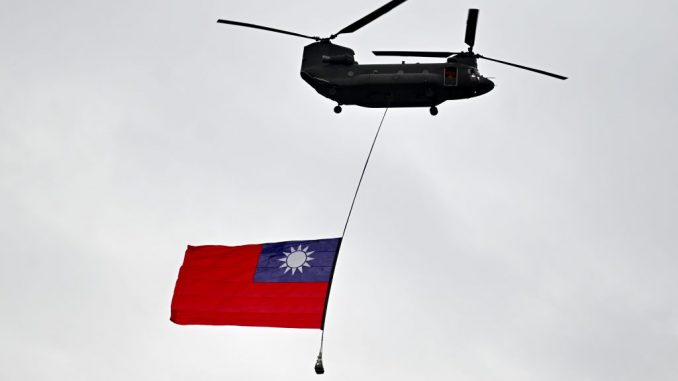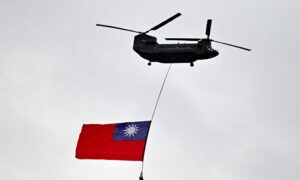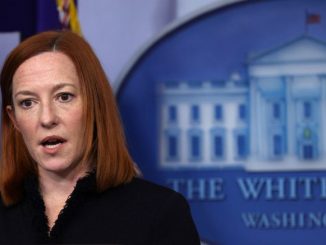

Commentary
It has been reported in various media outlets, including The Epoch Times, The Australian, and The Guardian, that Australian Prime Minister Scott Morrison mistakenly referred to the “one country, two systems” framework when discussing the Republic of China, better known as Taiwan.
However, since 1972, Australia’s official policy, which has bipartisan support, recognises China’s sovereignty over Taiwan, which is regarded as a renegade province. The joint communiqué between the People’s Republic of China and Australia, signed in the early 1970s, clearly states that the “Australian government does not recognise the ROC [the Republic of China] as a sovereign state and does not regard the authorities in Taiwan as having the status of a national government.”
Currently, Taiwan is recognised by 14 countries, mainly in South America (including Guatemala, Honduras, Belize, Nicaragua), Vatican City, and some Pacific islands, as a sovereign nation. But both Australia and the United States adhere to the “One China” policy.
China’s controversial Anti-Secession Law, adopted on Mar. 14, 2005, does not mention the “one country, two systems” framework with regards to Taiwan. This framework is only in place for Hong Kong and Macau and recently has been substantially dismantled by Beijing’s subsequent adoption of the National Security Law in July 2020, which condones the arrest of pro-democracy activists in Hong Kong.
Now that Australia’s “One China” policy has been in place for about half a century, it is appropriate to question the acceptability in maintaining this policy, especially at a time when Beijing pursues its geo-political objectives and ostentatiously seeks world domination.
There are various reasons why the continued adherence to the “One China” policy is problematic and should be revised.
First, it is important to stress that Taiwan has never been part of Communist China.
China only ruled it for about two hundred years from the middle of the 17th century. Japan originally colonised Taiwan between 1895 and 1945 and, as such, became a “Japanese” island.
When Japan surrendered in August 1945, thereby ending the Second World War in the Pacific, Chiang Kai-shek was asked by the United Nations to administer Taiwan. Taiwan was never a breakaway or renegade province of Communist China. Hence, the Chinese narrative on this issue is seriously flawed.
Second, in a revealing article by Frank Mount, published in Quadrant Online, it is argued that an independent Taiwan is essential to the continued existence of Japan because “if China occupied Taiwan it would be able to amass significant and seriously threatening naval power both east and west of Japan.”
He adds that “China wants Taiwan because it is a key strategic link in the First Island Chain. If China can take control of Taiwan, its navy will gain strategic level access to the North Pacific.”
Third, the current geopolitical ambitions of China are destabilising the free world.
These ambitions are evidenced by its “wolf warrior diplomacy” in its relationship with Australia and the United States; its use of vaccine diplomacy, which involves donating or selling COVID-19 vaccines throughout the world; Beijing’s initial reluctance to allow a team of experts to investigate the origins of the virus; the Belt and Road Initiative, which effectively subjugates some developing countries to China; its adoption of legislation to crush Hong Kong’s freedoms; and human rights abuses in Xinjiang.
Fourth, as leading Western democracies, Australia and the United States have a moral obligation to meaningfully respond to the geopolitical ambitions of China. In this context, I am reminded by the prophetic words of German theologian and Lutheran pastor Martin Niemöller. In discussing the failure of German leaders and intellectuals in the 1930s to speak out against the evil of Nazism, he poetically remarked:
First they came for the socialists, and I did not speak out—
Because I was not a socialist.
Then they came for the trade unionists, and I did not speak out—
Because I was not a trade unionist.
Then they came for the Jews, and I did not speak out—
Because I was not a Jew.
Then they came for me—and there was no one left to speak for me.
This observation has been a poignant reminder that evil actions inevitably spawn more evil actions because evil needs to be fed to stay relevant—there is a kind of historical determinism about this.
There is, of course, no doubt that China would respond furiously if Australia and/or the United States were to go the route of recognising Taiwan as an independent country. Undoubtedly, it would dramatically affect Australian exports to China, with serious, perhaps devastating, consequences for diverse sectors of the economy.
But how could a failure to address an international abomination be morally justified?
In any event, the recognition of Taiwan would provide Australia with an opportunity to further redirect and diversify its economy, which may well be an unintended benefit of any Chinese action in this regard.
Alternatively, at a minimum, Taiwan should be invited to participate in the work of international agencies. The international community would do itself a disservice if it were to disregard any legitimate attempt by Taiwan to participate in world affairs.
In this context, it is useful to mention that Taiwan reportedly sent an email on Dec. 31, 2019, to warn the World Health Organisation (WHO) of a possible viral infection cycle in Wuhan. If these concerns had been taken seriously at that time, perhaps it would have been possible to halt the spread of COVID-19.
However, the WHO failed to take Taiwan’s request for information seriously because it did not recognise it as a state, a clear example of shooting the messenger to favour certain political ideologies.
Taiwan is a de facto country; it has a functioning democracy and is self-governing. It is a wealthy neighbour of Australia with a confident populace. It should be supported by like-minded democracies in the world because, as Martin Niemöller reminds us, next time, they might come after us.
Gabriël A. Moens is an Emeritus Professor of Law at The University of Queensland. He is also the Emeritus Editor-in-Chief of the International Trade and Business Law Review and has taught extensively across Europe, Asia, and North America. He is the author of short stories and a novel about the origins of the Covid-19 virus, A Twisted Choice (Boolarong Press, 2020)
Views expressed in this article are the opinions of the author and do not necessarily reflect the views of The Epoch Times.






Be the first to comment